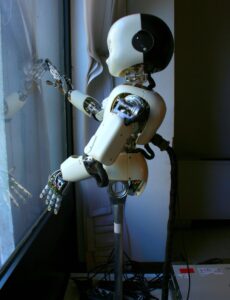Last year I wrote a paper on robot consciousness to submit to a conference, only to realize that there is a better approach to establishing this argument than the one I took. In Sartrean Phenomenology for Humanoid Robots, I attempted to draw a connection between Sartre’s description of self-awareness and how this can be applied to robotics, and while at the time I was more interested in this higher-order understanding of the self, it might be a better idea to start with an argument for phenomenal consciousness. I realized that technically, iCub already has phenomenal consciousness and its own type of qualia, a notion I should develop more before moving on to discuss how we can create intelligent, self-aware robots.
What I originally wanted to convey was how lower levels of consciousness act as a foundation from which higher-order consciousness emerges as the agent grows up in the world, where access consciousness is the result of childhood development. Because this paper is a bit unfocused, I only really talked about this idea in one paragraph when it should be its own paper:
“Sartre’s discussion of the body as being-for-itself is also consistent with the scientific literature on perception and action, and has inspired others to investigate enactivism and embodied cognition in greater detail (Thompson 408; Wider 385; Wilson and Foglia; Zilio 80). This broad philosophical perspective suggests cognition is dependent on features of the agent’s physical body, playing a role in the processing performed by the brain (Wilson and Foglia). Since our awareness tends to surpass our perceptual contents toward acting in response to them (Zilio 80), the body becomes our centre of reference from which the world is experienced (Zilio 79). When Sartre talks about the pen or hammer as an extension of his body, his perspective reflects the way our faculties are able to focus on other aspects of the environment or ourselves as we engage with tools for some purpose. I’d like to suggest that this ability to look past the immediate self can be achieved because we, as subjects, have matured through the sensorimotor stage and have learned to control and coordinate aspects of our bodies. The skills we develop as a result of this sensorimotor learning enables the brain to redirect cognitive resources away from controlling the body to focus primarily on performing mental operations. When we write with a pen, we don’t often think about how to shape each letter or spell each word because we learned how to do this when we were children, allowing us to focus on what we want to say rather than how to communicate it using our body. Thus, the significance of the body for perception and action is further reinforced by evidence from developmental approaches emerging from Piaget’s foundational research.”
Applying this developmental process to iCub isn’t really the exciting idea here, and although robot self-consciousness is cool and all, it’s a bit more unsettling, to me at least, to think about the fact that existing robots of this type technically already feel. They just lack the awareness to know that they are feeling, however, in order to recognize a cup, there is something it is like to see that cup. Do robots think? Not yet, but just as dogs have qualia, so does iCub and Haikonen’s XCR-1 (Law et al. 273; Haikonen 232–33). What are we to make of this?

Works Cited
Haikonen, Pentti O. ‘Qualia and Conscious Machines’. International Journal of Machine Consciousness, World Scientific Publishing Company, Apr. 2012. world, www.worldscientific.com, https://doi.org/10.1142/S1793843009000207.
Law, James, et al. ‘Infants and ICubs: Applying Developmental Psychology to Robot Shaping’. Procedia Computer Science, vol. 7, Jan. 2011, pp. 272–74. ScienceDirect, https://doi.org/10.1016/j.procs.2011.09.034.
Thompson, Evan. ‘Sensorimotor Subjectivity and the Enactive Approach to Experience’. Phenomenology and the Cognitive Sciences, vol. 4, no. 4, Dec. 2005, pp. 407–27. Springer Link, https://doi.org/10.1007/s11097-005-9003-x.
Wider, Kathleen. ‘Sartre, Enactivism, and the Bodily Nature of Pre-Reflective Consciousness’. Pre-Reflective Consciousness, Routledge, 2015.
Wilson, Robert A., and Lucia Foglia. ‘Embodied Cognition’. The Stanford Encyclopedia of Philosophy, edited by Edward N. Zalta, Spring 2017, Metaphysics Research Lab, Stanford University, 2017. Stanford Encyclopedia of Philosophy, https://plato.stanford.edu/archives/spr2017/entries/embodied-cognition/.
Zilio, Federico. ‘The Body Surpassed Towards the World and Perception Surpassed Towards Action: A Comparison Between Enactivism and Sartre’s Phenomenology’. Journal of French and Francophone Philosophy, vol. 28, no. 1, 2020, pp. 73–99. PhilPapers, https://doi.org/10.5195/jffp.2020.927.